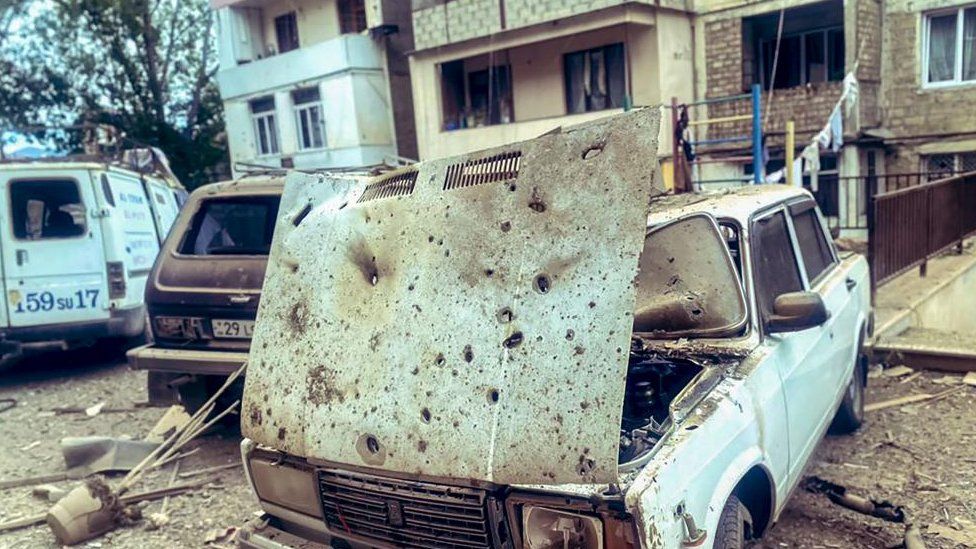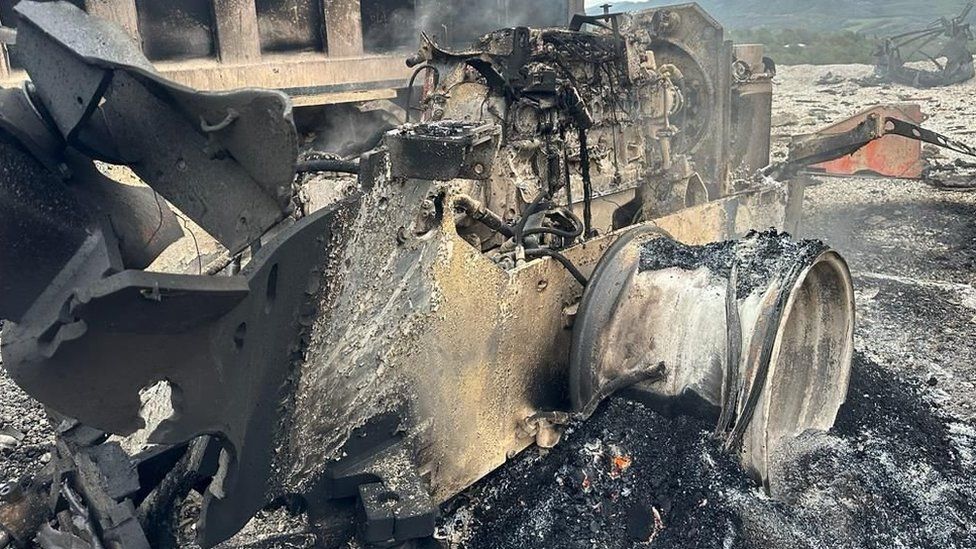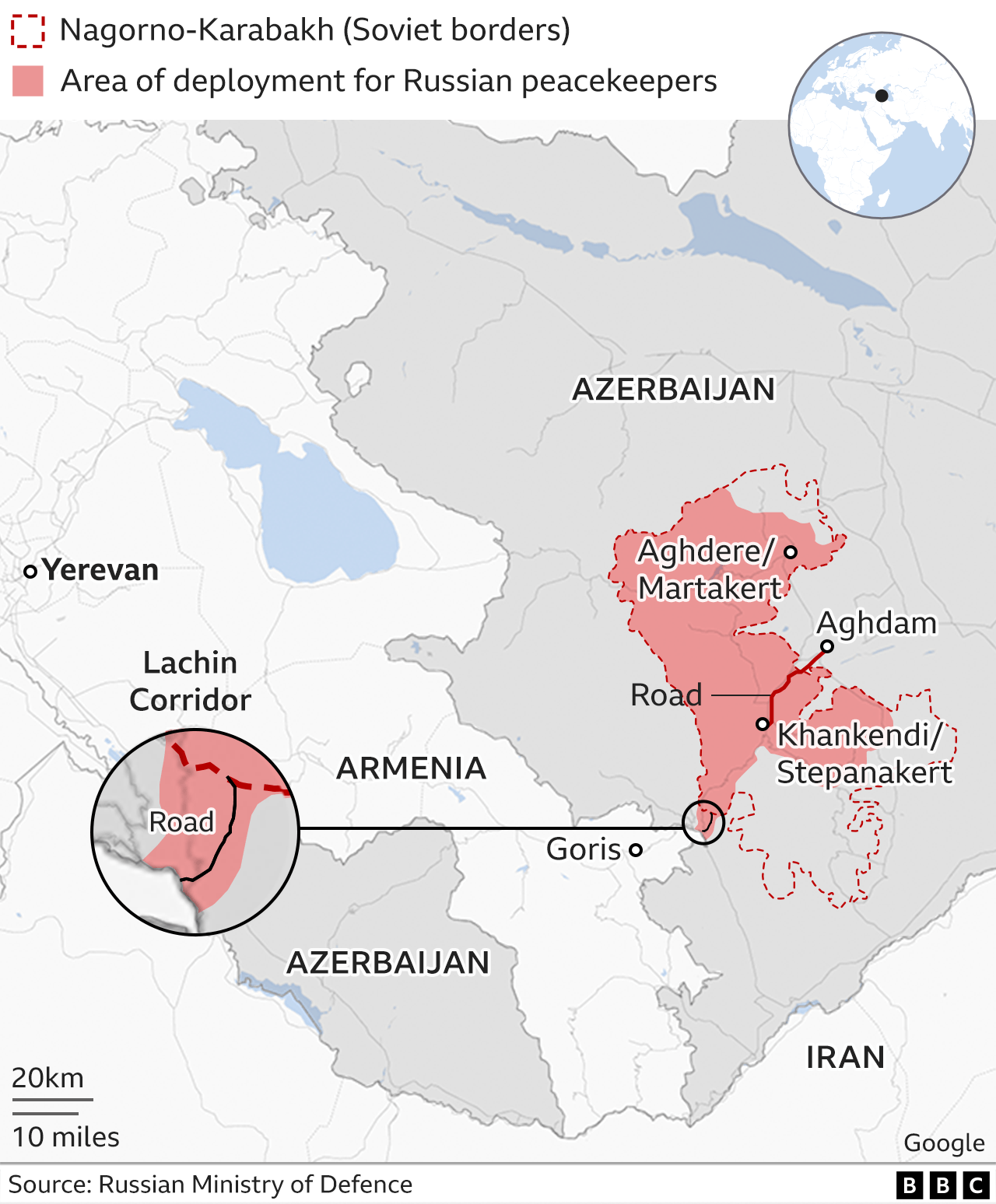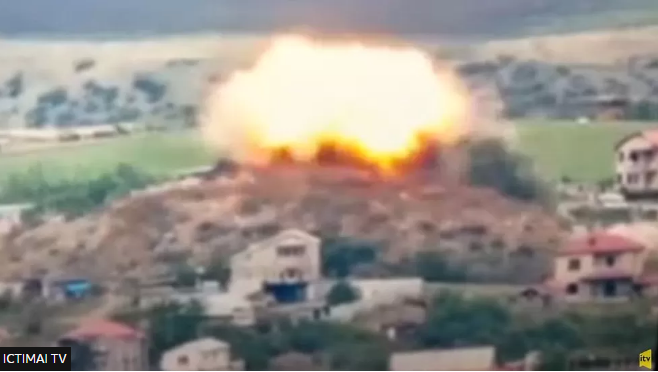Azerbaijan has launched "anti-terror" operations in Nagorno-Karabakh, and said it will not stop until ethnic-Armenian separatists surrender.
Tensions in the South Caucasus have been high for months around the breakaway enclave, recognised internationally as part of Azerbaijan.
Azerbaijan and Armenia last went to war three years ago.
Baku ordered "Illegal Armenian military formations" to hand over arms and dissolve their "illegal regime".
Azerbaijan and Armenia first went to war in the early 1990s after the fall of the Soviet Union. Then in 2020 Azerbaijan recaptured areas in and around Nagorno-Karabakh before a truce was agreed and monitored by Russian peacekeepers.
Ethnic Armenians in Karabakh appealed on Tuesday for a ceasefire and for talks to start. But it was clear from the Azerbaijani ultimatum that Baku's aim was to complete its conquest of the mountainous enclave.
Armenian Prime Minister Nikol Pashinyan accused Azerbaijan of starting a ground operation aimed at "ethnic cleansing".
But hundreds of Armenian protesters, frustrated by their country's response, clashed with police outside parliament in Yerevan, condemning their leader as a traitor and calling on him to resign.
Azerbaijan said talks could start in the town of Yevlakh, some 100km (60km) north of the Karabakh regional capital of Khankendi, called Stepanakert by ethnic Armenians.
 IMAGE SOURCE,SARGSYAN/OC MEDIA/EPA-EFE/REX/SHUTTERSTOCK Buildings and vehicles were damaged by shelling in the Karabakh regional capital
IMAGE SOURCE,SARGSYAN/OC MEDIA/EPA-EFE/REX/SHUTTERSTOCK Buildings and vehicles were damaged by shelling in the Karabakh regional capital
Since the end of 2020, 3,000 Russians have monitored the fragile truce but Moscow's attention has been diverted by its full-scale invasion of Ukraine.
An estimated 120,000 ethnic Armenians live in the mountainous enclave. Russia said its soldiers were evacuating civilians from Karabakh and had moved almost 500 from the most at-risk areas.
For the past nine months Azerbaijan has imposed an effective blockade on the only route into the enclave from Armenia, known as the Lachin Corridor.
Azerbaijan said it had launched its operation in response to the deaths of six people, including four police, in two fatal landmine explosions on Tuesday morning.
Air raid sirens then rang out and the sound of artillery and gunfire could be heard in Karabakh's main city. Residential buildings were damaged and journalist Siranush Sargsyan described seeing a building next door being hit.
Karabakh officials said five people had been killed and dozens more wounded, including women and children.
Defence officials in the breakaway region said the Azerbaijani military had "violated the ceasefire along the entire line of contact with missile-artillery strikes". Other Karabakh representatives spoke of a "large-scale military offensive" although later reports said that the intensity of fire had decreased.
The Azerbaijan defence ministry insisted it was not targeting civilians or civilian buildings, and that "only legitimate military targets are being incapacitated by the use of high-precision weapons".
It accused Armenian forces of "systematic shelling" of its army positions and said it had responded by launching "local, anti-terrorist activities... to disarm and secure the withdrawal of formations of Armenia's armed forces from our territories".
 IMAGE SOURCE,AZERBAIJAN DEFENCE MINISTRY Azerbaijani officials posted images of what they said was the aftermath of a deadly landmine blast
IMAGE SOURCE,AZERBAIJAN DEFENCE MINISTRY Azerbaijani officials posted images of what they said was the aftermath of a deadly landmine blast
In a brief televised address, Armenia's prime minister rejected claims that his military was involved.
Russia's foreign ministry said it had been warned of the Azerbaijani offensive only minutes in advance and urged both countries to respect a ceasefire signed after the war in 2020. The EU's regional special representative, Toivo Klaar, said there was "urgent need for immediate ceasefire".
South Caucasus commentator Laurence Broers said on Tuesday the Armenian population in Karabakh had been weakened by the blockade and the Azerbaijan operation had been launched "seemingly to retake Armenian-populated Karabakh in its entirety".
Nikol Pashinyan said recently that Russia was "spontaneously leaving the region". Azerbaijan has meanwhile had strong support from its ally Turkey.
Hikmet Hajiyev, special adviser to Azerbaijan's President Ilham Aliyev, called on the separatist ethnic-Armenian administration to "dissolve itself".
"Azerbaijan has always said we are ready to provide rights and security of Karabakh Armenians under the constitution," he told BBC News.
Azerbaijan had denied building up troop numbers in the region. On Monday, it allowed aid from the International Committee of the Red Cross into Karabakh on two roads, one via the Lachin Corridor from Armenia and the other on Azerbaijan's Aghdam road.
Before Tuesday's offensive began there had been hopes that tensions might subside.
The Azerbaijan defence ministry released images of a vehicle which it said were destroyed by a land mine, but ethnic Armenian officials said it was Azerbaijan's military that had violated the ceasefire.
Armenia-Azerbaijan: Nagorno-Karabakh map

Latest Stories
-
Mobile money transactions hit GH¢649.2bn in only 2 months of 2025
3 minutes -
500 small businesses to benefit from Republic Bank’s Caribbean Export programme
46 minutes -
5 dead as Islamic protesters clash with Nigerian military, police
47 minutes -
Black Kulcha Music releases ‘Love & Reasons Riddim’ album
1 hour -
Thank you for the kind well wishes – Vice President on ill health
1 hour -
McDan begins search for partners to establish industrial salt hub
1 hour -
T-bills auction: Government misses target for second time; interest rates fall marginally
1 hour -
President Mahama headlines AETC 2025 in Accra
2 hours -
Delivery of quality education: rehabilitation of classroom blocks enhances learning environment in North Tongu
3 hours -
Let Ghanaians know what happened to the Vice President on Friday – NPP
3 hours -
Tarkwa TNA Stadium to host MTN FA Cup semis
3 hours -
‘The aim of every coach is to win trophies’ – Prosper Ogum
4 hours -
Gold discovered in seven districts of Upper East Region – Minister
4 hours -
Ahafo Regional Minister raises alarm over rising drug abuse among youth
4 hours -
Tomato paste research: Who will give the consumer some clarity?
5 hours

